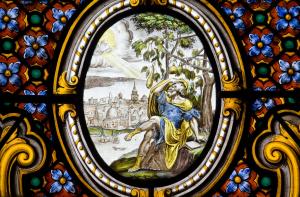
The Christian faith is meant to lived, not just studied or spoken about. We must make sure our faith is a living faith, not a dead one. We must not assume that knowledge about the faith, and acceptance of what one has been told, is enough; we must do much more than see Christianity is good in theory; we must put it into practice. And yet, until we put do so, all that it is for us is merely a theory. No matter how well we express that theory, no matter how many glorious ideas we can demonstrate about it through our words, it is all for naught if we do not go beyond such reflections and live it out. James, of course, made this clear:
What does it profit, my brethren, if a man says he has faith but has not works? Can his faith save him? If a brother or sister is ill-clad and in lack of daily food, and one of you says to them, “Go in peace, be warmed and filled,” without giving them the things needed for the body, what does it profit? So faith by itself, if it has no works, is dead (Jas. 2:14-17 RSV).
If we know we need to eat, and so make pictures of food, those pictures will not satisfy our need; we will find ourselves wasting away. If we write cookbooks, but never actually cook the food and eat it, we will starve. On the other hand, if we eat, and write down the recipes after we have been well-nourished, then our work can be helpful for others in the future, making sure that they know what they need to have nutritious meals for themselves. What is important is that when we are hungry, we eat; if we don’t, we will starve to death. This is very similar to the Christian faith. It does not thrive when it is treated merely as holding the right propositions about the world and what is in it; rather, it must be something which we engage. We must live out its dictates, for only then will it supply us what we need. If all we do is paint a pretty picture about the faith through our words, eventually our faith will falter as the reality we experience will not be so pretty. If we don’t act, our faith will likely die. Thus, a Christian is not someone who believes in good, pious thoughts, nor someone who treats the faith as a philosophical science where we seek the truth and discus our findings with others, but rather, a Christian is someone who seeks to live out all the ramifications of the truth so that they can find their spirit enriched by the grace they receive when they properly act upon what they believe. Christians are not meant to sit around doing nothing. Quietism, which is not the same as hesychasm, leads to an annihilation of the faith because of its rejection of all activity.
While Christians are expected to act upon their beliefs, this does not mean they are expected to do so by making a spectacle of the faith, that is, to do great and wondrous deeds in front of others, drawing attention to themselves. Some, of course, will find themselves in situations where they might end up doing something spectacular, but in general, Christians find themselves living out the faith often by doing what appears to be unremarkable. They will strive to be a good neighbor to those around them, being kind and considerate to others without making a show of it. This is how Christians are to be the light of the earth; they should seek to do what is good, and doing good in ways which reflect the greater good and truth they receive from their faith. This is the proper fruit of our faith, the kind which Christ looks to find within us; if we do not produce it, we risk finding ourselves cut off from him. “Every branch of mine that bears no fruit, he takes away, and every branch that does bear fruit he prunes, that it may bear more fruit” (Jn. 15:2 RSV). And so, one of the monastic elders in the desert said that we should strive to produce the fruit which goes along with our words:
An elder said, “If a soul has words but no deeds, it is like a tree that has leaves but no fruit. Just as a tree bearing much fruit also has a plentiful array of leaves, so a word is appropriate for a soul given to good works.” [1]
Leaves are an important part of a tree; and so, just as our words represent such leaves, reflecting upon the faith and speaking what we learn does have a role in our lives. Nonetheless, we must not be so focused on those thoughts, on the leaves, that we forget to live out our faith, for then we will produce none of the fruit which is meant to go alone with those leaves. Of course, we know we will likely stumble, but when we do so, all we need to do is just get back up and continue what we were doing, and that means, living out our faith by loving God and our neighbor as ourselves. The more we do so, the easier it will be for us to get back up. Thus, though our righteousness comes from God, we must cooperate with God if we want that righteousness to last.
Praxis is key to the spiritual life. We must not ignore our neighbor and their needs, and this means we must always be doing good deeds. “And let our people learn to apply themselves to good deeds, so as to help cases of urgent need, and not to be unfruitful” (Tit. 3:14 RSV). Now, the deeds are not always going to be one and the same. Most people we meet likely will not be in need of urgent care, but everyone needs love and respect, and so we should strive to show it to all. This is how we reveal ourselves to be truly Christian, for we reveal ourselves to be followers of Christ by our love. Words without such love will never be enough.
[1] John Wortley, trans., The Book of the Elders: Sayings of the Desert Fathers (Collegeville, MN: Cistercian Publications, 2012), 173-74 [N252].
Stay in touch! Like A Little Bit of Nothing on Facebook.
If you liked what you read, please consider sharing it with your friends and family!












